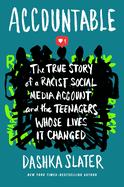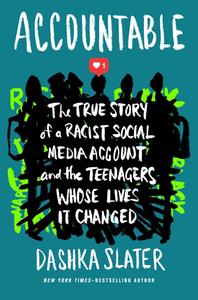
 Award-winning journalist Dashka Slater (The 57 Bus) is brilliant at dissecting a true-crime story, exhibiting its different parts for readers, and relating a balanced narrative that illustrates the nuances inherent in all interpersonal interactions, in person or online. Accountable centers on a teen's private social media account, where he posts racist and sexist content for the entertainment of his friends.
Award-winning journalist Dashka Slater (The 57 Bus) is brilliant at dissecting a true-crime story, exhibiting its different parts for readers, and relating a balanced narrative that illustrates the nuances inherent in all interpersonal interactions, in person or online. Accountable centers on a teen's private social media account, where he posts racist and sexist content for the entertainment of his friends.
One afternoon Charles, a 17-year-old Korean American, creates what his male friends view as a humorous meme. Charles enjoys making memes and, at his friends' urging, starts a private Instagram account to feature memes like the first--which was actually a racist attack on a classmate. "His model was the stuff he saw online... some of which was funny precisely because it was offensive. Charles didn't think too deeply about the morality.... What mattered was that these memes made his friends laugh." He continues to post to the account, filling it with sexist and racist "jokes" that use minority girls from his high school--many of whom he considers friends--as targets. The account has only a dozen followers, but like anything online, it does not remain private for long. The exposure of the content sets off a series of events--suspensions, protests, legal actions--that embroil parents, students, and staff in the ugliness of Charles's online activity. What a few teens view as "edgy" humor ultimately harms his entire California town.
While readers' instinctive response may be to say Charles deserves what he gets, Slater's meticulous research from multiple perspectives highlights the difficulties of attempting to define absolute right and absolute wrong. Does accountability ever go too far? Does it not go far enough? And, since algorithms are specifically designed to prey on intense emotional responses, where does online platforms' accountability fit into the equation?
Slater ultimately shows readers that, while racist actions can be unconscious, they remain offensive and harmful, and the perpetrator should be held accountable. Silence, too, she communicates, is a form of condoning racism and contributes to the problem. But Slater does not solve problems or answer the questions; instead, she scrupulously illustrates the complexity of this case and reminds the audience that there are no quick fixes. This is an moving book with the power to make readers look deep within themselves for ways they can contribute to the solutions and keep from becoming a part of the problem. --Jen Forbus, freelancer
Shelf Talker: Journalist and author Dashka Slater expertly conducts a vivisection of an online racism scandal that reveals scars on the beating heart of a small town in California.

